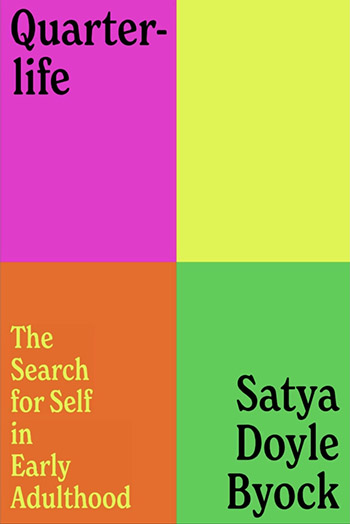

Book Title: Quarterlife: The Search for Self in Early Adulthood
Year Published: 2022
Quarterlife: The Search for Self in Early Adulthood
I’m stuck. What’s wrong with me? Is this all there is? Satya Doyle Byock hears these refrains regularly in her psychotherapy practice where she works with “Quarterlifers,” individuals between the ages of (roughly) sixteen to thirty-six. She understands their frustration. Some clients have done everything “right”: graduate, get a job, meet a partner. Yet they are unfulfilled and unclear on what to do next. Byock calls these Quarterlifers “Stability Types.” Others are uninterested in this prescribed path, but feel unmoored. She refers to them as “Meaning Types.”
While society is quick to label the emotions and behavior of this age group as generational traits, Byock sees things differently. She believes these struggles are part of the developmental journey of Quarterlife, a distinct stage that every person goes through and which has been virtually ignored by popular culture and psychology.
In Quarterlife, Byock utilizes personal storytelling, mythology, Jungian psychology, pop culture, literature, and client case studies to provide guideposts for this period of life. Readers will be able to find themselves on the spectrum between Stability and Meaning Types, and engage with Byock’s four pillars of Quarterlife development:
• Separate: Gain independence from the relationships and expectations that no longer serve you
• Listen: Pay close attention to your own wants and needs
• Build: Create, cultivate, and construct tools and practices for the life you want
• Integrate: Take what you’ve learned and manifest something new
Quarterlife is a defining work that offers a compassionate roadmap toward finding understanding, happiness, and wholeness in adulthood.
About Satya Doyle Byock
Pacifica Program Graduate: 2010, MA in Counseling Psych
Satya Doyle Byock is the director of The Salome Institute of Jungian Studies, a psychotherapist, and the author of “Quarterlife: The Search for Self in Early Adulthood,” published by Random House on July 26th of this year. Her work is driven by a desire to influence the way developmental psychology views and attends to the first twenty years of adulthood, as well as by Jungian psychology, social justice advocacy, and trauma-informed care. You can find her at SatyaByock.com and SalomeInstitute.com
“My clinical work, teaching, and writing draw influences from a few primary areas, including Jungian psychology, trauma research, feminist theory, and the study of race and racism worldwide. In addition to my Masters in Depth Psychology, my Bachelors in History continues to inform my view of the world through an understanding of the histories of power and oppression through the ages.
“With clients, I pursue an understanding of how each person can live their truest life within a complex world. My goal for my clients is not to be “normal.” Nor do I focus exclusively on symptom mitigation. While I am always working to find ways to support in the easing of symptoms such as depression, anxiety, shame, and loneliness for the short and longterm, I believe we are all far more philosophical and contemplative creatures than we tend to acknowledge. By tapping into that space of self-knowledge and meaning, transformation from pain can occur far beyond the simple eradication of symptoms. Our pain and suffering often comes from old wounds that can be healed, but they’re often also tied to reflections on one’s life in a world that may not feel safe, good, or meaningful.
“My work focuses on that time of life between adolescence and adulthood that I call Quarterlife. Very little attention has been paid to this part of human development, and I think it is one of the most critical junctures for defining a vibrant and meaningful life. I think it can also be a key to greater social well-being overall as people can adjust their adult lives towards their true values early-on, versus just participating in a social order that others created, based-on values that serve the interests of very few.
“Some of my writing on these topics can be found in Psychological Perspectives, on goop, and elsewhere.”



